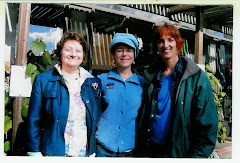
Independent Sunday schools fill niche in Bay Area
Friday July 27, 2007
J. The Jewish News Weekly of Northern California
by penina eilberg-schwartz
j. intern
Jewish education is “a great gift, and a gift that’s available” — whether or not you’re affiliated with a synagogue.
This is what David Waksberg, executive director of the S.F.-based Bureau of Jewish Education, says.
Waksberg, who admits that his own religious education failed to prepare him to be the kind of Jew he wanted to be, appreciates that many things have changed since his school days.
There are, in the Bay Area, a few independent Sunday and Hebrew schools that serve unaffiliated Jews, as well as Chabad schools, and at these schools education can be a lot more hands-on.
...
Another option in Berkeley is Jewish Arts, Culture and Torah School (JACTS). It, too, offers drama and music, as well as Hebrew and history.
The principal, Rabbi Sara Shendelman, believes that the school succeeds because it helps students feel “connected” to Judaism. It serves preschool- through eighth-grade students.
A rabbi ordained in the Renewal movement, Shendelman says teachers use a “more spiritual approach” in the classroom. But she also notes that JACTS is a place that accommodates parents who want their children to enjoy strong Jewish identities without overwhelming commitment.
JACTS employs “creativity, music, arts, and making of ritual objects” to help kids explore what it means to be Jewish.
Corliss Lesser, whose daughter went through JACTS’ bat mitzvah program, now is an arts instructor at the school. During her eight years with JACTS as a teacher, she has enjoyed helping children express themselves through the arts.
In founding the school, Shendelman hoped that artists like Lesser could have freedom to teach in an inclusive and highly artistic environment.
....
At no-pressure Jewish school, kids learn Hebrew sitting on rug
Sonja Rothkop
Bulletin Correspondent
If a school's approach to learning about Judaism is intimate and fun, then what students learn stays relevant beyond the classroom, said Sara Shendelman, founder and director of the Jewish Arts, Culture and Torah School in Berkeley.
"The main thing is to make this a refuge of safety and shelter for them," Shendelman said. "The world is disntegrating around us, and we want to give them a rockk to stand on."
Shendelman, who has been teaching for 25 years, started the school years ago with a class of four 4-year-olds. At the time, she recalls being frustrated because "kids' education had some big holes in it."
Held afternoons and Sundays, classes supplement a basic academic education. Current enrollment is 85 students ranging in age from 4 to 16.
The philosophy is to avoid the standard "American academic models of straight schools," Shendelman said.
"This is not a classroom setting. We teach Hebrew on a rug on the floor. There are no report cards or tests, either.
"There's no pressure; the point is to help them make sense of their lives - to heal the soul, not learn intellectual facts.
"The students learn just as much, if not more, with such a painless, stress-free approach," Shendelman said.
For example, the school's emphasis on art - such as crafting ritual objects that the students take home to keep - personalizes the learning process.
"Making seder plates, candies and candlesticks, matzah covers, really connects them to the holiday, and their art work gets used," Shendelman said. "We let the kids run the gamut of not only their talent, but also their interests."
Students enroll in the school at all levels of religious observance. Shendelman strives to find the specific bond that each child might feel with his or her Jewishness. If not through religion, then through culture, social causes or cooking.
The school also takes an alternative approach to bar and bat mitzvah preparation. The program includes traditional text study, history and holidays and art.
"It's very engaging," Shendelman said. "I have seen two students arguing over a point of Talmud."
She added that parents are sometimes surprised and grateful to learn that they don't have to belong to a synagogue to have a bar mitzvah for their child.
"I tell them it can be in their home with a potluck lunch afterward - it doesn't have to be an extravaganza," she said.
The post-bar mitzvah retention rate has been high - 90 percent have chosen to continue - and the response from the younger students has been good.
It seems to be a formula that works for the people we're working with. We would like to see this paradigm used in many locales.





No comments:
Post a Comment